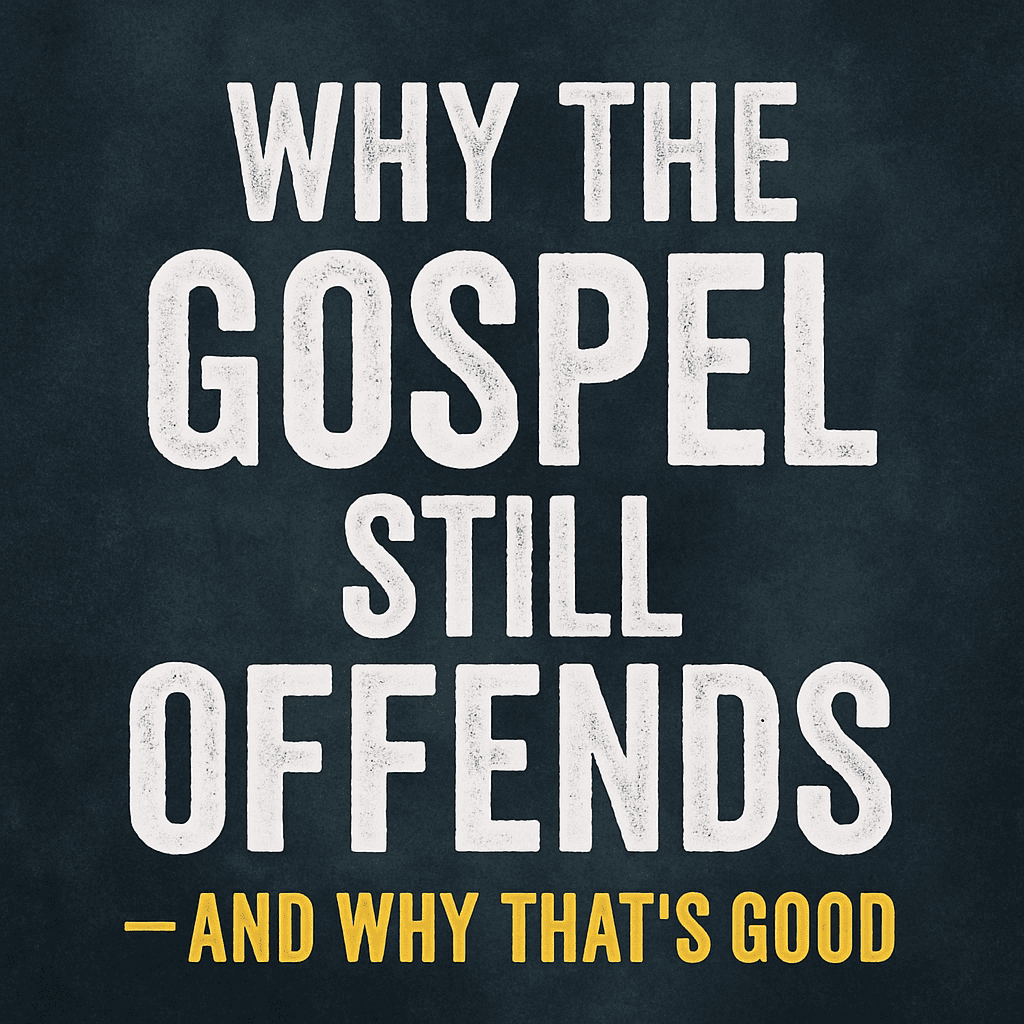Why the Gospel Still Offends (And Why That’s a Good Thing)
There’s a reason people keep trying to clean up the gospel. They want it to sound more polite, more palatable, less offensive. We’ve heard it softened into slogans, rebranded as self-help, and stripped of anything that might cause someone to feel uncomfortable. But here’s the truth: a gospel that doesn’t offend can’t save. And that’s why the gospel still offends—because it cuts straight through our pride, our excuses, and our attempts to justify ourselves before God.

The Gospel Doesn’t Start With Good News
Nobody wants to be told they’re wrong. Nobody wants to be told their heart is deceitful or that they stand guilty before a holy Judge. But that’s where the gospel begins. Not with encouragement, but with a diagnosis.
That’s why the gospel still offends—because it starts by telling us we’re not okay.
The message of the cross isn’t that you’re basically good and just need a spiritual boost—it’s that you’re dead in sin and in need of resurrection. That’s not popular. That’s not marketable. But it’s true.
Foolish to the World, Powerful to the Redeemed
1 Corinthians 1:18 says, “The word of the cross is folly to those who are perishing, but to us who are being saved it is the power of God.” The same message that brings life to one person sounds like nonsense to another.
If you’ve ever wondered why the gospel still offends the world, it’s because it refuses to tell people what they want to hear.
The gospel confronts what we’d rather avoid. It exposes our rebellion. It tells us we can’t save ourselves. And it demands a response.
A Message That Refuses to Flatter
The gospel doesn’t flatter. It doesn’t say, “You’re enough.” It says, “You need a Savior.” That’s offensive to a world obsessed with self-esteem and personal freedom. But that offense is exactly what leads to repentance. We don’t come to Christ because we’re affirmed—we come because we’re convicted.
Paul Knew Why the Gospel Still Offends
The Apostle Paul understood this. In Galatians 5:11, he said, “If I still preach circumcision, why am I still being persecuted? In that case, the offense of the cross has been removed.” In other words, if Paul had simply changed the message to be more acceptable, people wouldn’t have had a problem with him. But the true gospel always causes a problem—for pride, for legalism, for those who want to be in control.
This isn’t some new cultural issue—it’s always been true why the gospel still offends those who want comfort without conviction.
What the Gospel Dismantles
This is why the gospel still offends today:
- It tells the religious person their good works can’t save them.
- It tells the rebellious person their “freedom” is slavery to sin.
- It tells the moral person that judgment is real and coming.
It dismantles every excuse we make to avoid bowing to Christ.
And yet—it’s the best news we’ll ever hear.
Broken Before Healed

Because once the gospel breaks you, it begins to heal you. Once it brings you to your knees, it lifts your head. The same message that exposes your sin offers you mercy. The same cross that offends your pride becomes your only hope.
Jesus Didn’t Pull Punches
Jesus didn’t soften His words to avoid upsetting people. He called sinners to repent. He warned the self-righteous that their religion wouldn’t save them.
He told His followers plainly: “If the world hates you, know that it has hated me before it hated you” (John 15:18).
Could it be that the very part of the gospel we try to soften is the part we most need to hear?
The Gospel Isn’t Supposed to Blend In
The gospel wasn’t safe in His day, and it’s not safe now. That’s because it was never meant to blend in—it was meant to stand out.
And if the message we preach never offends anyone, we may not be preaching the same gospel Jesus did.
There’s no way around it—why the gospel still offends is tied directly to why it still transforms.
The Call Is Still the Same
There’s a reason the crowds loved Jesus when He healed them, but turned on Him when He preached truth. They wanted miracles, not surrender. They wanted a blessing, not a bloody cross.
Jesus made it clear in Luke 9:23: “If anyone would come after me, let him deny himself and take up his cross daily and follow me.” That isn’t a feel-good quote. It’s a death sentence to pride.
The Gospel Offends Because It Saves
So yes, the gospel offends. And that’s a good thing. Because only an offensive gospel can confront the real condition of our hearts, only a gospel that wounds our pride can save our souls.
The gospel still offends for the same reason it still saves: it refuses to lie to us, pamper our ego, or coddle our sin. Instead, it tells us the truth and then offers us grace.
That kind of gospel will never be popular. But it will always be powerful.
Want to understand what the Bible really teaches about election?
👉 Download my free pamphlet: Chosen by Grace
A simple, Scripture-focused guide to God’s sovereignty in salvation.
Discover why salvation depends not on man’s will or effort, but on God who has mercy.
Walt Roderick is a Christian writer who cares more about biblical clarity than online applause. He writes to strengthen believers and confront spiritual drift.






